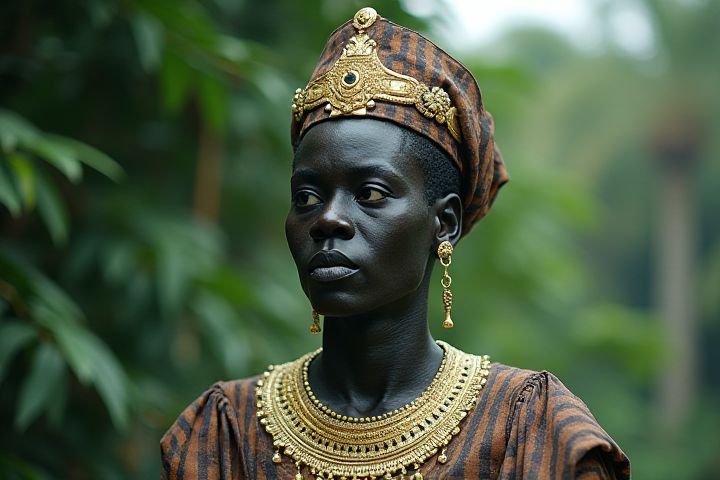
Nigeria's government operates as a federal republic, characterized by a multi-tiered system that includes executive, legislative, and judicial branches. The President serves as both the head of state and head of government, elected for a four-year term and endowed with significant powers. The National Assembly comprises two chambers: the Senate and the House of Representatives, responsible for crafting legislation and representing the diverse interests of Nigeria's 36 states and the Federal Capital Territory. The judiciary, independent of the executive and legislative branches, interprets laws and ensures justice through various courts, including the Supreme Court of Nigeria. This political structure promotes a balance of power, although challenges such as corruption and governance issues persist in the nation's democratic journey.
Federal Republic structure
The Federal Republic of Nigeria operates under a federal system that emphasizes the distribution of power between the central and state governments. Its government structure prioritizes democratic governance, rule of law, and accountability, promoting local autonomy while ensuring national unity. Key focus areas include economic development, national security, education, and infrastructure, as well as addressing corruption and fostering transparency. You can see this commitment reflected in various policies and initiatives aimed at empowering states and enhancing citizen participation in government affairs.
Three-tier government system
Nigeria's government operates on a three-tier system, comprising federal, state, and local government levels that ensure decentralized governance. The federal government focuses on national issues including defense, foreign policy, and trade, while state governments manage regional matters such as health, education, and infrastructure development. Local governments are responsible for community-level services, emphasizing grassroots participation in governance and enhancing citizen engagement. This structure aims to promote accountability and resource allocation, pinpointing the unique needs of diverse populations across the country.
Presidential system
Nigeria's government operates under a presidential system characterized by a separation of powers among the executive, legislative, and judicial branches. The President, elected for a four-year term, serves as both the head of state and government, implementing policies aimed at national development and security. The government prioritizes economic diversification, social infrastructure, and the fight against corruption while fostering democratic values and citizenship engagement. As a citizen, understanding these focuses can empower you to participate meaningfully in civic activities and governance.
36 states and one Federal Capital Territory
The Nigerian government emphasizes decentralization and development across its 36 states and the Federal Capital Territory, Abuja. Each state has its own government, aimed at addressing local needs, enhancing economic growth, and improving infrastructure in areas like transportation, health, and education. With initiatives targeting poverty alleviation and job creation, the government works to empower citizens and foster sustainable development. Your participation in local governance can further enhance accountability and transparency within these efforts.
National Assembly with two chambers
Nigeria's National Assembly, consisting of the Senate and the House of Representatives, primarily focuses on lawmaking, oversight of the executive branch, and representing the interests of citizens. The Senate, with its 109 members, deliberates on critical issues such as national security, fiscal policies, and international treaties, while the House of Representatives, comprising 360 members, addresses local constituencies' concerns and social welfare programs. Both chambers collaborate on the federal budget, ensuring transparency and accountability in public spending. Engaging in various committees, they also scrutinize legislation affecting areas like education, health care, and infrastructure development across Nigeria.
Executive led by the President
The Nigerian government, under the leadership of the President, primarily focuses on economic growth, infrastructure development, and national security. Efforts are directed towards diversifying the economy away from oil dependency by promoting agriculture, technology, and manufacturing sectors. In terms of infrastructure, initiatives include improving roads, power supply, and public transportation systems to enhance connectivity and boost trade. National security priorities involve combating terrorism, addressing insurgency in regions like the Northeast, and ensuring the protection of citizens against crime and violence.
Independent judiciary
The Nigerian government emphasizes the significance of an independent judiciary to uphold the rule of law and ensure fair legal processes. This focus aims to strengthen judicial integrity, thereby fostering public confidence in legal institutions. By advocating for an impartial judiciary, the government seeks to reduce corruption and enhance the protection of human rights. Ultimately, an independent judiciary is crucial for maintaining democratic governance and facilitating social justice in Nigeria.
Multi-party political system
Nigeria's government emphasizes a multi-party political system to enhance democratic governance, allowing diverse political voices and ideologies to participate in the electoral process. This system fosters competitive elections, ensuring that various political parties can represent different segments of the population, promoting inclusivity and accountability. By encouraging multi-party participation, Nigeria aims to mitigate ethnic and regional tensions, providing a platform for dialogue and collaboration among various groups. Your engagement in this political framework is vital for shaping policies that reflect the interests and aspirations of the citizens.
Constitution as supreme law
Nigeria's government emphasizes the Constitution as the supreme law that governs the nation, establishing the framework for civil rights and the rule of law. The 1999 Constitution outlines the separation of powers among the Executive, Legislature, and Judiciary, ensuring checks and balances among these branches. Key features include the protection of fundamental human rights, federalism, and the promotion of social justice. By upholding the Constitution, the government aims to foster stability, promote democratic governance, and enhance the overall welfare of its citizens.
Oil as a major economic factor
The Nigerian government prioritizes oil as a crucial economic driver, contributing significantly to the nation's Gross Domestic Product (GDP) and export revenues. This focus on the oil sector is reflected in policies aimed at attracting foreign investments, increasing oil production capacity, and enhancing infrastructure for oil extraction and refining. Oil revenue also plays a vital role in funding government budgets, impacting social services, and driving economic development. However, reliance on oil presents challenges, such as vulnerability to price fluctuations and a pressing need for diversification into other sectors like agriculture and technology.
